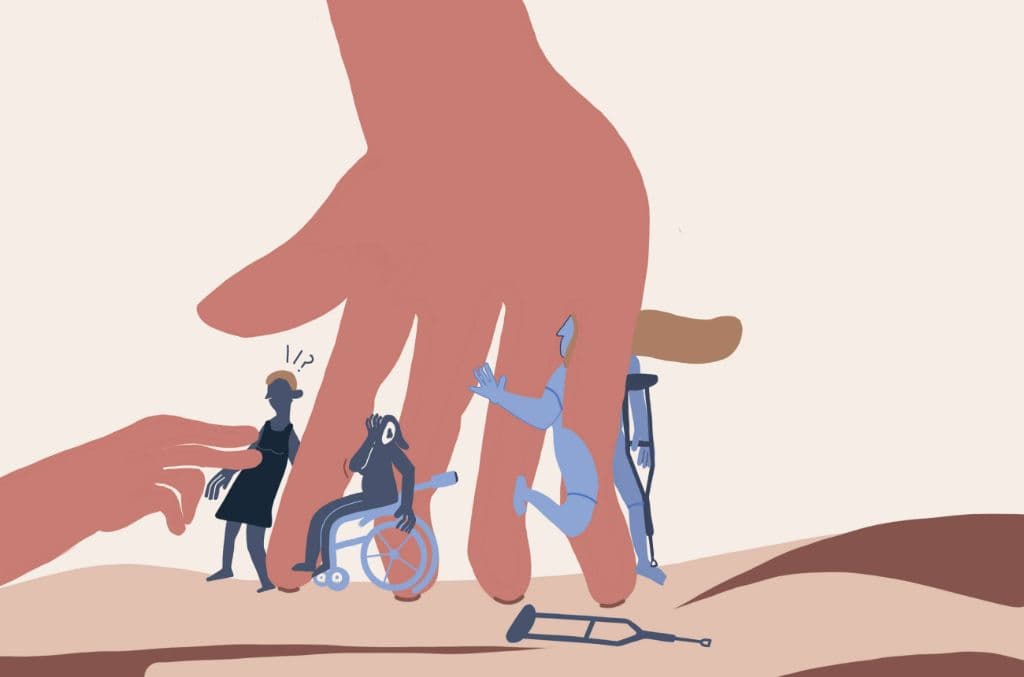Women with disabilities face 3 times the likelihood to be physically or sexually assaulted. The figure becomes staggeringly higher when it comes to people with developmental disabilities, with almost about 80% of them facing sexual assault in their lives. Some of these women have been assaulted multiple times. The numbers clearly establish that we are dealing with an epidemic, yet it is something hardly talked about.
The term disability covers physical, intellectual, and developmental infirmities. Disabled women not only face the same problems as able-bodied and minded women, but there is also the added limitation of not having the social or intellectual tools and education to defend themselves.
Findings suggest that most of these assaults are carried out by people known to the victim, very often their caregivers or people in the institutions that house them – an abhorrent reality. The disproportionate power dynamic that exists between a disabled person and their caregiver creates a situation conducive to abuse and equally difficult to report.
On January 1, 2013, in Noida, a father allegedly raped his physically handicapped daughter by sedating her while the mother was away. The 16-year-old girl recounted the incident to her mother, who reported the crime. But truly, how many such cases can ever hope to reach the police station?
A convenient and uninformed narrative of considering the disabled asexual, further exacerbates the issue. There seems to be a stigma attached to the sexuality of the disabled, to the point that many are sterilized and most denied the possibility of marriage or motherhood. Even more shocking is the lack of education regarding sex and the complete disregard for the vulnerable positions of these women. The precarious lack of education manifests itself when we realize that the majority of disabled women are unaware that sexual assault is a criminal offense.
As a case study from Human Rights Watch elucidates – “Kanchana,” a 19-year-old woman with an intellectual disability from a village in West Bengal, was raped several times in 2013 by a local man. Kanchana was not aware that she should report being raped, which was only discovered when she was five-months’ pregnant. And her intellectual disability made it difficult to explain to the police what had happened.
Women with intellectual disabilities seem to be ‘easy targets’ in particular. There exists not only the cognitive difficulty associated with reporting these incidents, but they are also met with ridicule and suspicion. It is also relatively easy to gaslight and mislead intellectually disabled people and blur their recollection of the incident, which leads to even lesser credibility. It is not surprising then, that only 3% of the cases of sexual abuse faced by developmentally disabled people are reported.
In the rare occurrence of these incidents being reported, victims are regularly faced with uncomfortable questions and mockery by the authorities, and humiliating ‘two-finger’ tests by medical professionals, among other things. The acute lack of training of the legal and medical personnel in dealing with disabled people is blatantly obvious. This is further compounded by the lack of adequate access to medical and legal care along with counselling, during the trial.
After the alarming Nirbhaya case in 2012, the Criminal Law (Amendment) Act passed in 2013 made an effort to include the concerns of disabled women by ensuring their fair and accommodative participation in the reporting and judiciary process. The Act makes provisions such as the right to record their statement with the police in the safety of their home or a place of their choice, or the right to have their police statements videotaped to save them from being traumatized repeatedly.
Despite the 2013 amendments to the Act, proper enforcement of its mandates is conspicuously tardy. In a country where even the most able-bodied and educated people have trouble navigating the judiciary system, what is to be expected of the close to 70% of the disabled population living in rural areas with little to no access to legal aid? Even though Indian laws state that the Government must provide compensation for all such cases, including interim relief when no trial takes place, the reality is quite bleak. In the rare occurrence that the compensation is disbursed, it just does not reach the right hands. As former chairwoman of the National Commission for Women, Lalitha Kumaramangalam, said in December 2015: “One of the biggest challenges for women [with disabilities] is access [to services], not just physical but access across the board.”
With the Government expressing growing concern over cases of sexual assault, special care must be taken to ensure the inclusion of disabled women. There is a need for a gender-sensitive disability law that focuses on the unique problems of these women, ranging from simplifying the complaint and redressal mechanisms to monitoring and regulating the activities of hospitals and shelter homes. More importantly, there must be adequate training of police officers, judiciary, and medical professionals.
The need of the hour is introspection, where we must ask ourselves, as feminists and human beings, how we make the struggles of females with disabilities invisible. How often do we realise that their struggles too are a part of our struggles? Every feminist movement, including the #metoo movement has been oblivious to the mounting hardships of these women. Let us not allow ourselves to be further divided on the basis of ability and in asking for our rights, also include those who may not have voices as loud as ours.

